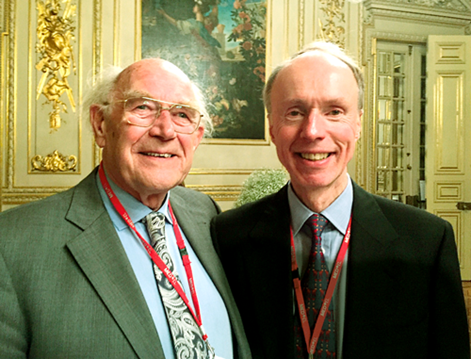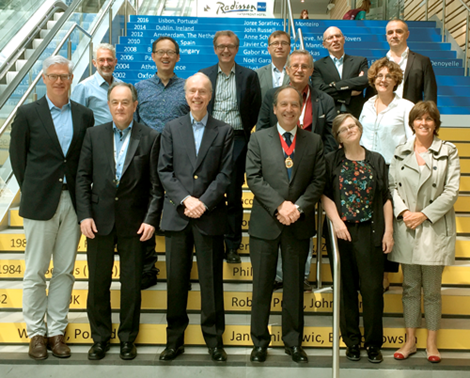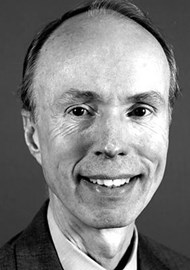Martin Bailey, Secretary-General of ESPO, narrates the story of a society which has promoted and supported the development of paediatric otolaryngology in Europe.
In the early 1950s, pioneers in paediatric otorhinolaryngology became active in European countries such as Poland, Hungary, Czechoslovakia, the UK and France. At least four categories of medical practitioner – family doctors, paediatricians, otolaryngologists and paediatric otolaryngologists – were (and still are) involved at three levels of care: primary, secondary and tertiary. At that time there were obvious differences between countries in the level of care provided, and this was reflected in the number of paediatric otolaryngologists practising in each country.
In 1968, a small group of paediatric otolaryngologists in Italy (Carlo Gatti Manacini, Renato Fior and Giulio Pestalozza) took the initiative to organise a conference in Sirmione to share their experience and discuss potential innovations.
EWGPO
In 1977 a second meeting followed, organised by the same group: the official 1st World Congress of Pediatric ORL. At the end of this event, the European Working Group in Pediatric Otorhinolaryngology (EWGPO) was founded.
After the conference, Robert Pracy (who had been Conference Chairman), Giulio Pestalozza and Robert Ruben decided to begin a new peer-reviewed journal, the International Journal of Pediatric Otorhinolaryngology. Manuscripts derived from conference presentations were selected for publication in the first and second editions of the journal. Under Editor-in-Chief, Robert Ruben, the journal has developed into a prominent forum to “concentrate and disseminate information concerning prevention, cure and care of otorhinolaryngological disorders in infants and children.”

Secretary-Generals past and present: Carel Verwoerd with Martin Bailey at ESPO 2016 in Lisbon.
In the years that followed, meetings of the EWGPO were held regularly in various countries, with local chairmen:
1979 Warsaw, Poland (Jan Danielewicz, Eva Kossowska)
1982 Bath, UK (Robert Pracy, John Evans)
1984 Sèvres (Paris), France (Philippe Narcy)
1986 Eger, Hungary (Jeno Hirschberg, Zoltan Labas)
1987 Nijmegen, Netherlands (Cor Cremers)
1988 Paris, France (Jacques Desnos)
1990 Ghent, Belgium (Paul van Cauwenberge)
1992 Sirmione, Italy (Renato Fior, Giulio Pestalozza)
1993 Jerusalem, Israel (Jacob Sade)
1994 Rotterdam, The Netherlands (Carel Verwoerd and Jetty Verwoerd-Verhoef)
ESPO
At the end of the Rotterdam meeting, Congress President, Carel Verwoerd, presented to the General Assembly a proposal to transform the Working Group into an official Society with Articles of Association (bylaws) and this was accepted by acclamation. The name was changed to the European Society of Pediatric Otorhinolaryngology (ESPO) and the bylaws were ratified by notary in Rotterdam in 1997. The first official Board of ESPO consisted of Carel Verwoerd (President); Renato Fior (Secretary-General); Cor Cremers (Treasurer); Paul Van Cauwenberge (Past-President); Pekka Karma (President-Elect); and Jetty Verwoerd-Verhoef, (Member representative).
ESPO purpose and bylaws
ESPO is a non-profit organisation, exclusively performing charitable, scientific and educational activities.
The main purpose of ESPO (bylaws article 3) is to promote the quality of otorhinolaryngological care for children by:
- Facilitating the dissemination of knowledge.
- Facilitating scientific communication and collaboration among members and among the different disciplines in the treatment of otorhinolaryngologic disorders in children.
- Supporting and promoting clinical and basic research.
- Organising meetings at which those interested in paediatric ORL can discuss clinical practice and present research papers.
- Promoting standards of professional practice.
- Promoting the training of otorhinolaryngologists who are concerned with the care of children.
The council is the governing body of ESPO (bylaws article 12). Members are proposed by national ORL or paediatric ORL societies in Europe, and each country can have two representatives. Countries outside Europe may be represented in the council by liaison delegates. The first delegates appointed were Robin Cotton (USA), Kimitaka Kaga (Japan), Ajay Kothari (India) and Tania Sih (Brazil). Today, liaison delegates include representatives of the five other main regional paediatric ORL societies worldwide:
- ANZSPO (Australian & New Zealand Society of Paediatric Otorhinolaryngology)
- APOG (Asia-Pacific Pediatric Otolaryngology Group)
- ASPO (American Society of Pediatric Otolaryngology)
- IAPO (Interamerican Association of Pediatric Otorhinolaryngology)
- PENTAFRICA (Paediatric ENT Africa)
In 2006, minor changes were made to the bylaws and, most importantly, the original distinction between minor conferences and major congresses (held alternately) was abolished. The bylaws were subsequently updated in 2011 and again in 2018 as the society grew and expanded its activities.
“The next congress will be held in Marseille (23-26 May 2020) under the chairmanship of Jean-Michel Triglia, with the theme, ‘Transfers, Bridges and Frontiers in Pediatric Otorhinolaryngology.”
The ESPO Board at ESPO 2018 in Stockholm.
ESPO Congresses
After 1994 conferences and congresses were held in:
1996 Siena, Italy (Desiderio Passali, Luisa Bellussi)
1998 Helsinki, Finland (Pekka Karma)
2001 Graz, Austria (Heinz Stammberger)
2002 Oxford, UK (John Graham, Chris Raine, Martin Bailey)
2004 Athens, Greece (Nikola Simasko, Thomas Nikolopoulos)
2006 Paris, France (Noël Garabédian, Jean-Michel Triglia, Patrick Froehlich, Françoise Denoyelle)
2008 Budapest, Hungary (Gábor Katona, Zoltan Farkas)
2010 Pamplona, Spain (Javier Cervera, Manuel Manrique)
2012 Amsterdam, The Netherlands (Anne Schilder, Hans Hoeve, Maroeska Rovers)
2014 Dublin, Ireland (John Russell)
2016 Lisbon, Portugal (Jorge Spratley, Luisa Monteiro)
2018 Stockholm, Sweden (Ann Hermansson, Georgios Papatziamos, Richard Kuylenstierna)
The number of conference participants has steadily increased from around 70 in 1984 (Sèvres,Paris) to more than 1500 at the 2018 congress in Stockholm! It is the largest paediatric otorhinolaryngology meeting in the world, held in Europe every two years but with speakers and delegates drawn from around the globe. The next congress will be held in Marseille (23-26 May 2020) under the chairmanship of Jean-Michel Triglia, with the theme, ‘Transfers, Bridges and Frontiers in Pediatric Otorhinolaryngology’ (www.espo-2020.org).
“The number of participants has steadily increased from around 70 in 1984 to more than 1500 in 2018.”
ESPO membership
Otolaryngologists, other medical specialists and non-medically qualified professionals with a special interest in ORL care for children are eligible for membership and are most welcome to participate in congresses, meetings and training programmes. We currently have members from 51 countries around the world, and individuals can join ESPO online at
www.espo.eu.com/membership/join-us
– membership confers a significant discount on the registration fee for ESPO Congresses!
Acknowledgement: I would like to thank Carel Verwoerd and Jetty Verwoerd-Verhoef for providing the original material upon which this article is based – and indeed for founding ESPO and fostering its development over many years!





